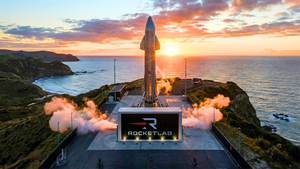
India is aggressively pursuing a "mission mode" strategy to establish itself as a global leader in critical and emerging technologies, including semiconductors, quantum computing, artificial intelligence (AI), space technology, and biomanufacturing. This concerted national effort, backed by substantial government investment and forward-looking policies, marks a pivotal moment for the nation's economic trajectory and its standing in the international tech arena. The immediate implications are profound, signaling a determined shift towards technological self-reliance, diversification of global supply chains, and the creation of a high-value, knowledge-based economy.
This ambitious push, evident in the numerous policy approvals and project launches as of September 2025, is set to redefine India's industrial landscape. By fostering indigenous innovation and attracting significant foreign and domestic investment, India aims to transform from a technology consumer into a formidable producer and innovator across these strategic sectors, with a clear vision to capture a substantial share of the global market in the coming decade.
A Deep Dive into India's Critical Tech Blueprint
India's strategic initiatives across these five critical technology domains are characterized by robust policy frameworks, significant financial commitments, and a focus on both foundational research and commercial application.
Semiconductors: The "Semiconductor Mission" is at the forefront, backed by an $18.2 billion investment. As of August 2025, ten projects have been approved, covering design, fabrication, testing, and packaging. A landmark development is the $11 billion fabrication plant in Gujarat, a collaboration between Tata Electronics and Taiwan's Powerchip Semiconductor, targeting chips for AI, automobiles, and data storage. India anticipates its first domestically produced semiconductor chip by the end of 2025, focusing on 28 to 90 nanometer technology. States like Karnataka and Tamil Nadu are complementing central incentives with their own attractive policies, aiming to reduce India's reliance on imported chips and project the country as a significant global chip manufacturer. The Indian semiconductor market is projected to exceed $100.2 billion by 2032.
Quantum Computing: Spearheaded by the National Quantum Mission (NQM), approved in April 2023 with a budget of approximately $730 million (₹6,003.65 crore) for 2023-2031, India is rapidly advancing its quantum capabilities. In April 2025, the Indian startup QpiAi unveiled "Indus," a 25-qubit quantum computer, marking a significant indigenous achievement. The NQM is establishing thematic hubs at major public universities and supporting startups, with the Amaravati Quantum Valley in Andhra Pradesh set to open in 2026. This mission aims to apply quantum advantage to pharmaceuticals, AI, telecommunications, and defense, positioning India as a global leader in quantum R&D and applications.
Artificial Intelligence (AI): The IndiaAI Mission is poised for substantial growth, with plans to nearly double its funding to approximately $2.4 billion (₹20,000 crore) over the next five years. This initiative focuses on developing indigenous AI, including foundational models, large language models, and large reasoning models. Key components include the IndiaAI Compute Capacity, IndiaAI Innovation Centre, and IndiaAI Datasets Platform. As of September 2025, institutions like IIT Bombay and companies such as Tech Mahindra (NSE: TECHM) and Fractal Analytics have been selected to lead the development of trillion-parameter large language models. Indian startups like Sarvam and SoketAI are also developing indigenous foundational models with multilingual and voice capabilities, supported by an expanded GPU capacity. The goal is to leverage AI to add $500 billion to India's economy by 2025, transforming sectors from healthcare to agriculture.
Space Technology: India's space economy is undergoing a massive expansion, projected to reach $50 billion by 2025 and $44 billion by 2033, capturing 8% of the global market. The Indian Space Policy 2023 and an amended Foreign Direct Investment (FDI) policy are driving private sector participation, with over 400 private space companies now operating. The Indian National Space Authorization Centre (IN-SPACe) is facilitating this growth, and ISRO continues its pivotal role, expanding global influence with cost-effective launch services. A dedicated $120 million venture capital fund further fuels innovation in the sector, aiming for India to fill the strategic gap left by diminished Russian participation in the global launch market.
Biomanufacturing: India is rapidly developing its biomanufacturing capabilities under the BioE3 Policy (Biotechnology for Economy, Environment & Employment), approved in August 2024. This policy aims for sustainable, high-performance biomanufacturing by integrating biotechnology with AI. In September 2025, a network of advanced biomanufacturing hubs was launched, providing infrastructure and expertise for scaling bio-based innovations. With over 2,000 project proposals received, many through Public-Private Partnership (PPP) models, India is focusing on areas like Carbon Capture & Utilisation, Smart Proteins, and Precision Biotherapeutics. India now hosts 21 of the 121 global bio-companies, aspiring to increase the biotech sector's growth from $10 billion in 2014 to $300 billion by 2030, creating 400,000 new jobs.
Market Movers: Companies Poised for Gains and Challenges
India's critical tech mission will inevitably create a new hierarchy of winners and losers among public and private entities, both domestically and internationally. Companies that align with the government's strategic vision and possess the necessary expertise and capital will likely see significant upside.
In the semiconductor space, Tata Electronics (a private entity of the Tata Group, but its success could positively impact publicly traded Tata companies like Tata Motors (NSE: TATAMOTORS) or Tata Steel (NSE: TATASTEEL) due to overall group strength and potential for cross-sector applications) is a clear frontrunner with its massive fabrication plant project. Global semiconductor equipment manufacturers and material suppliers, such as Applied Materials (NASDAQ: AMAT) or ASML Holding (NASDAQ: ASML), could also benefit from increased orders as India builds out its infrastructure. Conversely, companies heavily reliant on imported chips for their products might face short-term supply chain adjustments but could gain from a more localized and diversified supply in the long run.
For quantum computing and AI, Indian IT services giants like Tata Consultancy Services (TCS) (NSE: TCS), Infosys (NSE: INFY), and Wipro (NSE: WIPRO) are well-positioned to leverage their vast talent pools and R&D capabilities. Their existing client bases and global reach make them ideal partners for implementing quantum and AI solutions across industries. Startups like QpiAi, Sarvam, and SoketAI, though currently private, are critical innovators and potential acquisition targets or future IPO candidates. Foreign tech giants like NVIDIA (NASDAQ: NVDA), a leader in AI chips, and IBM (NYSE: IBM), with its quantum computing initiatives, could find increased demand for their hardware and platforms in India, or face competition from indigenous solutions.
The space technology sector presents opportunities for established players like Larsen & Toubro (L&T) (NSE: LT), which has a significant presence in defense and aerospace manufacturing, and newer private space companies like Skyroot Aerospace and AgniKul Cosmos (both currently private). These companies could secure lucrative contracts for satellite manufacturing, launch services, and ground infrastructure. Global satellite operators and communication companies may find new partnerships or competition as India expands its constellation capabilities. The increased private sector involvement also means potential for a vibrant ecosystem of ancillary service providers.
In biomanufacturing, pharmaceutical and biotechnology companies such as Biocon (NSE: BIOCON) and Dr. Reddy's Laboratories (NSE: DRREDDY) could benefit from the BioE3 Policy's focus on advanced manufacturing and R&D. The establishment of new biomanufacturing hubs will support smaller biotech startups, potentially leading to a wave of innovation in areas like sustainable chemicals, precision biotherapeutics, and climate-resilient agriculture. International biopharma companies may look to India as a strategic manufacturing and R&D hub, potentially increasing foreign direct investment in the sector.
Broader Implications: Reshaping Global Tech Dynamics
India's mission mode for critical technologies is not just an internal economic strategy; it is a significant geopolitical and industrial play that will reverberate across global tech dynamics. This initiative fits squarely into broader industry trends of supply chain de-risking, technological sovereignty, and the race for leadership in next-generation technologies.
The aggressive push in semiconductors aims to diversify a globally concentrated supply chain, making the world less vulnerable to disruptions from geopolitical tensions or natural disasters. This could ease the pressure on existing chip manufacturing hubs like Taiwan and South Korea but also introduce a new competitive player. The emphasis on indigenous manufacturing could lead to ripple effects, prompting other nations to bolster their own domestic production capabilities.
In quantum computing and AI, India's "AI for All" and social inclusion approach offers a distinct model compared to the more commercially driven or state-controlled AI development in other major powers. This could foster unique applications and ethical frameworks for AI, potentially influencing global standards. The rapid scaling of AI compute capacity and indigenous LLM development will intensify the global race for AI supremacy, potentially leading to new collaborations or competitive pressures for established AI leaders in the US and China.
The liberalization of India's space sector and the rise of private players are transforming it from a predominantly government-led endeavor to a commercial powerhouse. This mirrors global trends seen in the US with companies like SpaceX and Blue Origin. India's cost-effective launch services, historically a competitive advantage for ISRO, could further disrupt the global launch market, especially for small satellite deployments. This creates opportunities for international partnerships and challenges for traditional space powers to maintain their market share.
Biomanufacturing is positioned as a key component of India's green growth strategy. By focusing on sustainable, high-performance bio-based solutions, India aims to reduce reliance on petroleum-based products and mitigate climate change. This aligns with global efforts towards a circular economy and could set new benchmarks for sustainable industrial practices. The BioE3 Policy could inspire similar initiatives in other developing nations, fostering a new wave of bio-innovation and manufacturing partnerships.
Historically, India has demonstrated its capability to achieve self-reliance in complex domains like nuclear technology and space. This mission mode approach, reminiscent of its green revolution for food security, signals a similar national resolve to achieve technological self-sufficiency and global competitiveness in these critical areas. Regulatory bodies will need to adapt quickly to the rapid pace of innovation, particularly in areas like data privacy for AI and ethical guidelines for biomanufacturing, to ensure responsible development.
The Road Ahead: Opportunities and Challenges
The coming years will be crucial for India's critical tech mission, presenting both immense opportunities and significant challenges. In the short term, the successful execution of approved projects, especially the semiconductor fabrication plants, will be paramount. Timely completion and efficient scaling of these facilities will build confidence and attract further investment. The immediate focus will also be on talent development, as a shortage of skilled professionals, particularly in AI and quantum computing, could hinder progress.
Long-term possibilities include India emerging as a reliable alternative hub for global technology supply chains, particularly in semiconductors, reducing geopolitical risks for multinational corporations. The indigenous development of AI and quantum capabilities could lead to breakthrough innovations tailored to India's unique needs, which could then be scaled globally. India's space sector could become a major commercial launch provider and a hub for satellite manufacturing and data services. Biomanufacturing could position India as a leader in sustainable industrial processes and advanced therapeutics.
Potential strategic pivots may involve deeper international collaborations, especially with countries possessing advanced expertise in these fields. India might also need to refine its incentive structures to remain competitive in attracting top-tier global talent and investment. Market opportunities will emerge in ancillary industries supporting these core technologies, from specialized software development to advanced materials and testing services.
Challenges include securing consistent, long-term funding, navigating complex intellectual property landscapes, and ensuring that technological advancements translate into inclusive economic growth. Geopolitical shifts could also influence global partnerships and market access. Potential scenarios range from India becoming a dominant tech power, significantly reshaping global supply chains and innovation, to a more modest but impactful role as a specialized hub in certain critical tech niches.
Wrap-Up: A New Era for Indian Innovation
India's mission mode for critical technologies represents a bold and strategic leap towards a future where the nation is not just a consumer but a formidable producer and innovator in the global tech landscape. The concerted efforts in semiconductors, quantum computing, AI, space technology, and biomanufacturing underscore a national commitment to self-reliance, economic growth, and technological leadership.
Key takeaways include the substantial government investment and policy support, the rapid development of indigenous capabilities (like the QpiAi "Indus" quantum computer), and the increasing involvement of both large corporations and a vibrant startup ecosystem. This push is set to create hundreds of thousands of high-quality jobs, diversify India's economy, and enhance its geopolitical influence.
Moving forward, investors should closely watch the execution of these ambitious projects, particularly the timelines for semiconductor fabrication plants and the commercialization of AI and quantum technologies. The performance of key public companies involved in these sectors, as well as the emergence of new private players and their potential for IPOs, will be critical indicators. Regulatory developments, international partnerships, and the government's continued commitment to funding and policy support will also be vital. India's journey promises to be transformative, offering significant opportunities for those who understand and adapt to this evolving technological frontier.
This content is intended for informational purposes only and is not financial advice




